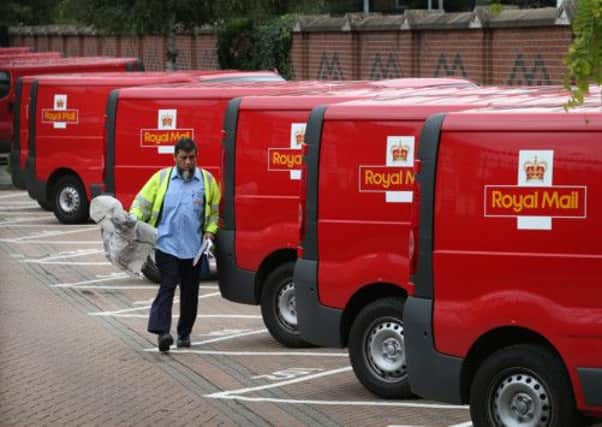Royal Mail ‘under threat’ as sell-off announced


The announcement of the final stage of postal reforms has prompted concerns that the six- day-a-week and same-price guarantee for wherever people live in the UK will be undermined.
The universal service obligation (USO) protects remote parts of Scotland from a reduced or more expensive service.
Advertisement
Hide AdAdvertisement
Hide AdThe sale of Royal Mail was announced in the Commons yesterday by Conservative postal minister Michael Fallon.
Labour said legislation did not provide a strong enough guarantee to prevent a privatised Royal Mail from dropping the universal service.
The government is also on a collision course with postal workers. The scale of anger was highlighted by a noisy reception given to Royal Mail chief executive Moya Greene as she addressed a meeting in Birmingham of more than 1,500 local officials of the Communication Workers Union (CWU).
She was booed, heckled and greeted with laughter when she defended the sell-off.
The union will now press ahead with balloting its members for strike action. That could start by mid-October, just as potential investors are being courted to buy shares.
Members of the public will be able to apply for shares – at a minimum of £750 – as well as institutional investors.
Analysts expect the sell-off will make up to £3 billion.
Mr Fallon said yesterday that the government was aiming for a majority sale so that Royal Mail could access capital markets like any other British business.
At least 50 per cent of the business will be sold, although Mr Fallon would not give exact details of the size of the sale and would not estimate how much money will be raised.
Advertisement
Hide AdAdvertisement
Hide AdAsked about the prospect of a strike by postal workers, he said: “Strike action will not derail the sale. There is no need for strike action – a pay rise of 8.6 per cent over three years has been offered.”
However, CWU general-secretary Billy Hayes said: “This isn’t about what’s best for the Royal Mail, it’s about vested interests of government ministers’ mates in the City.
“Privatisation is the worst way to access to capital as it’s more expensive than borrowing under public ownership.”
Labour’s postal services spokesman Ian Murray, the MP for Edinburgh South, said the government had failed to ensure the long-term future of the USO.
Addressing Mr Fallon, he said: “You claim the USO is written in legislation, but I am sure you can envisage a scenario whereby a privatised Royal Mail comes to the government in future and asks for alterations to legislation.”
The SNP warned that the sell-off could be “particularly harmful” for Scotland.
MP Mike Weir said: “This is a deeply flawed Westminster decision, which threatens to have particularly harmful consequences for Scotland, where so many of our rural communities and so much of our rural economy rely on our existing Royal Mail service.”
Mr Fallon insisted that “the overall objective of our reform is to continue to secure the universal postal service”.
Q&A
What has the government announced?
Advertisement
Hide AdAdvertisement
Hide AdA MAJORITY shareholding in Royal Mail will be listed on the London Stock Exchange through an initial public offering in the coming weeks. Its size is yet to be confirmed as it will depend on market conditions and demand.
What is being offered to Royal Mail employees?
around 150,000 eligible staff will be offered 10 per cent of shares. They will be able to buy additional shares, subject to a minimum application of £500.
How much will their free shares be worth?
Traders at ETX Capital estimate Royal Mail will be valued at between £2.8 billion and £2.9bn when it lists. This would see 150,000 staff offered shares worth around £2,000 each based on a £3bn listing.
How can members of the public buy shares?
Retail investors aged over 18 and based in the UK can buy shares at a minimum of £750 and can also apply through intermediaries or direct by post or online.
When the offer opens, direct applications can be made online using a debit card or by downloading and returning an application form with a cheque or bankers’ draft by post. A list of firms acting as intermediaries for the flotation can be found on www.gov.uk/royalmailshares.
What are the plans for shareholder dividend payments?
Royal Mail plans to pay an initial shareholder dividend of £133 million in July 2014, of which 10 per cent will go to Royal Mail staff with free shares, worth around £88.67 each.
SEE ALSO